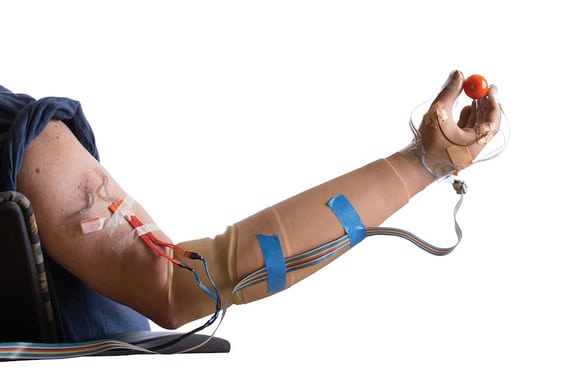A mechanical hand using DARPA-created neural advancements has turned into the first to permit an incapacitated patient to feel physical sensations through a prosthesis. It can help amputees feel the touch. The 28 year-old patient on which it is first tested had the capacity to figure out which mechanical finger was being touched whilst blindfolded, with aggregate exactness.
The tolerant’s character has not been uncovered for security reasons, however a DARPA press discharge expresses that he was left deadened because of extreme spinal wounds. Before, test patients have possessed the capacity to control prostheses by means of thought alone, however the innovation had been a restricted road. An individual could send signs to the hand from the mind with a specific end goal to control the prosthesis however it got no material tactile information consequently, making it hard to coordinate exact developments.
The new study takes the study of prosthetic innovation to another level, permitting two-path correspondence between a mechanical hand and its client. The deed was expert by running wires joined with terminals on the subject’s tangible cortex: the mind’s piece in charge of distinguishing material sensations and engine cortex: the part that coordinates body developments, to the prosthesis.
The mechanical hand that interfaces with the DARPA tech was created by the Applied Physics Laboratory at Johns Hopkins University. Torque sensors coordinated into the gadget have the capacity to identify when weight is being connected to the prosthesis, changing over power into electrical signs which are transmitted to, and translated by the subject’s cerebrum.
Amid lab testing, the patient was blindfolded while scientists touched each of the hand’s bionic fingers. The patient depicted the sensation, expressing that it was as though his own hand were being touched.
“At a certain point, rather than squeezing one finger, the group chose to squeeze two without letting him know,” remarks program administrator for DARPA’s Revolutionizing Prosthetics program, Justin Sanchez. “He reacted jokingly asking whether some individual was attempting to play a trap on him. That is the point at which we realized that the sentiments he was seeing through the mechanical hand were close common.”
It is trusted that improvements taking into account the innovation could one day see amputees and those affliction from loss of motion have entry to brain control prostheses that permit people to feel afresh.

